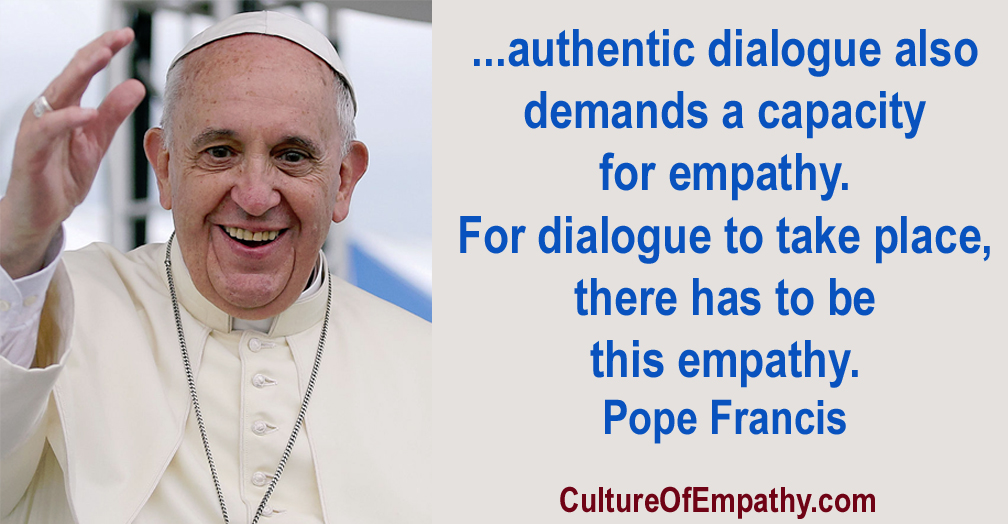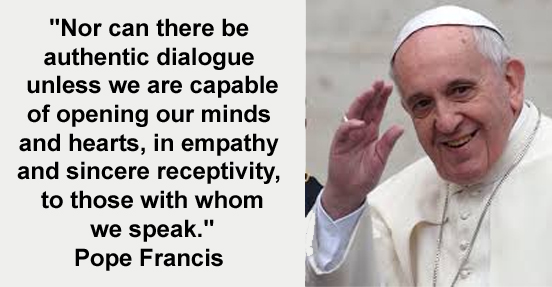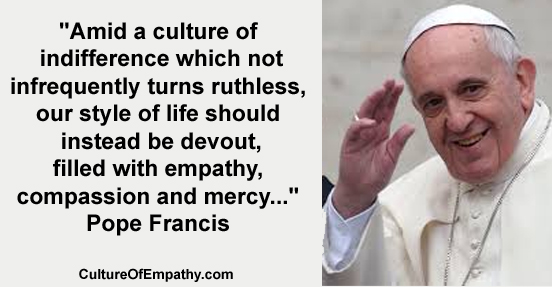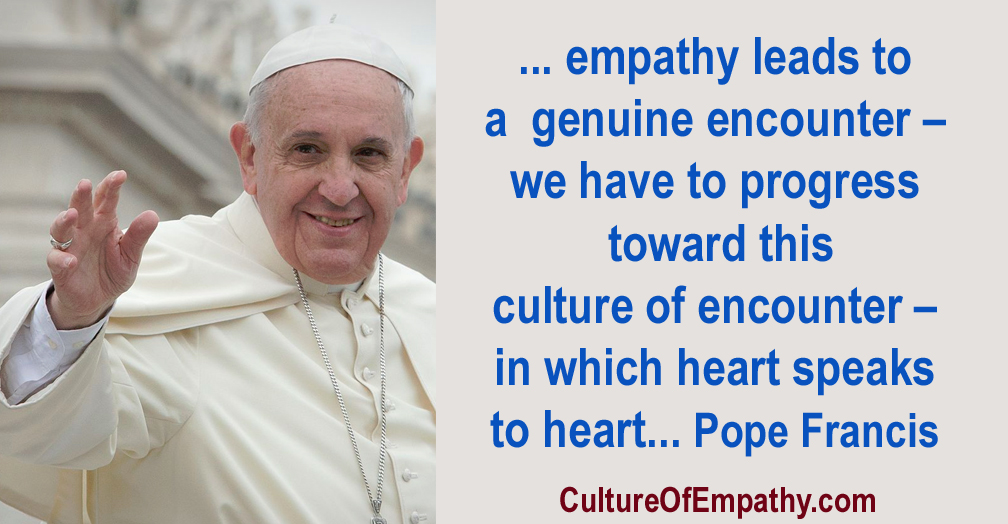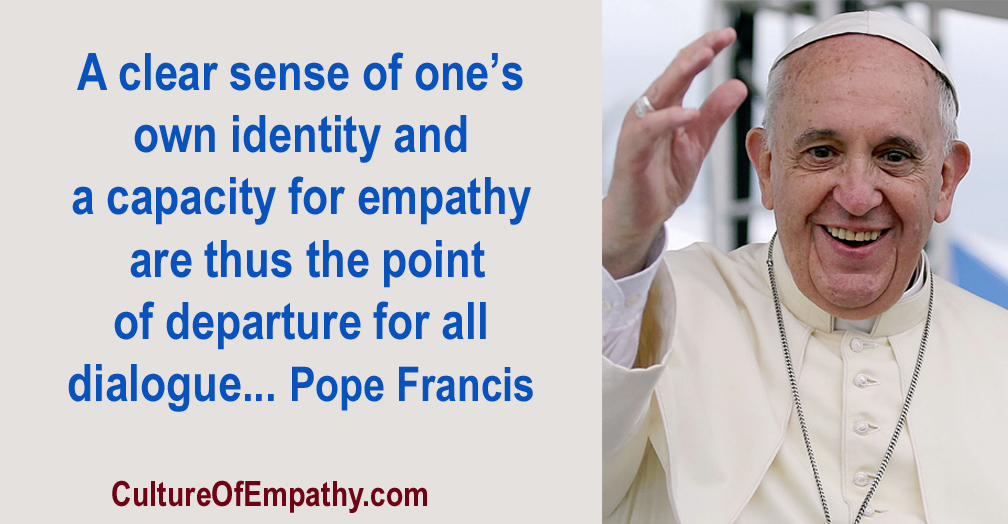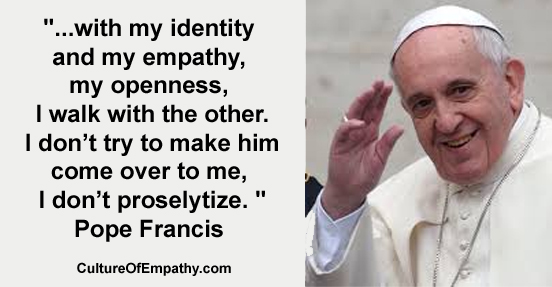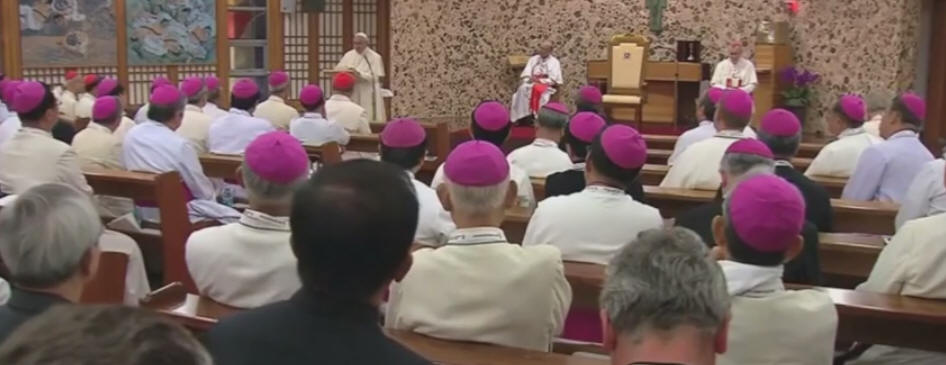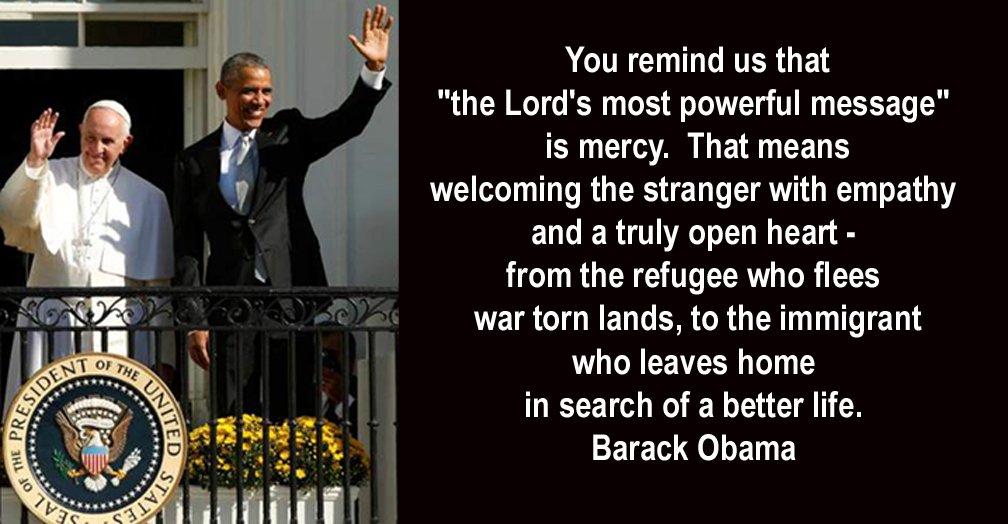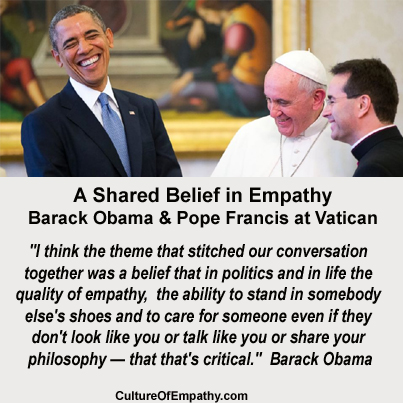|
|
|
Culture of Empathy Builder: Pope Francis
Quotes
"...authentic dialogue also demands a capacity for empathy. For dialogue to take place, there has to be this empathy." Pope Francis
"This capacity for empathy enables a true human dialogue in which words, ideas and questions arise from an experience of fraternity and shared humanity." Pope Francis
"This capacity for empathy leads to a genuine encounter – we have to progress toward this culture of encounter – in which heart speaks to heart..." Pope Francis
A clear sense of one’s own identity and a capacity for empathy are thus the point of departure for all dialogue...... Pope Francis
Pope advocates for 'globalization of empathy' in curing rare diseases "On Friday Pope Francis told participants in a Vatican stem cell summit that a renewed sense of empathy ought to fuel their work and research, ensuring that no person goes without access to proper care. “It is fundamentally important that we promote greater empathy in society, and not remain indifferent to our neighbor’s cry for help, including when he or she is suffering from a rare disease,” the Pope said April 29. “this is why the globalization of indifference must be countered by the globalization of empathy."
Pope Francis Gets the Moral Framing Right: A global empathy for all humanity, all of lifeby George Lakoff These are just a few examples of the many metaphors and frames used to powerful effect in this document. They have one thing in common, which they also share with the progressive value system: they are rooted in a worldview based on empathy.This is Empathy writ large, beyond individual empathy: it is a global empathy for all humanity, all of life -- animals, fish, plants, and Nature, which provides all life. What is absent is the all too common narrow view of religion as about individuals alone, in which THE spiritual issue is whether YOU get into Heaven, and that is a matter of personal responsibility. You are responsible for yourself, not for others, not for all of life and what is life-giving. That narrow view of individual, not social or global responsibility is completely absent from the Pope's message.
(13-18 AUGUST
2014)
-
APOSTOLIC JOURNEY OF HIS HOLINESS POPE FRANCIS TO With My Identity, My Empathy and Openness, I The Pope's Roadmap for the Asian Church (transcript of where he talks about empathy.) "We cannot engage in real dialogue unless we are conscious of our own identity. We can’t dialogue, we can’t start dialoguing from nothing, from zero, from a foggy sense of who we are. Nor can there be authentic dialogue unless we are capable of opening our minds and hearts, in empathy and sincere receptivity, to those with whom we speak. In other words, an attentiveness in which the Holy Spirit is our guide.
A clear sense of one’s own identity and a capacity for empathy are thus the point of departure for all dialogue......
Finally, together with a clear sense of our own Christian identity,
authentic dialogue also demands a capacity for empathy. For dialogue to
take place, there has to be this empathy.
"This is the good news that demands from each one a step forward, a perennial exercise of empathy, of listening to the suffering and the hopes of others, even those furthest away from me, and walking the demanding path of that love which knows how to give and spend itself freely for the good of all our brothers and sisters."
VISIT OF THE HOLY FATHER TO CASERTA MEETING WITH THE CLERGY ADDRESS OF
POPE FRANCIS
Dialogue is so important, but to dialogue two things are necessary: one’s identity as a starting point and empathy toward others. If I am not sure of my identity and I go to speak, I end up bartering my faith. You cannot dialogue without starting from your own identity, and empathy, which is a priori not condemning. Every man, every woman has something of their own to give us; every man, every woman has their own story, their own situation and we have to listen to it. Then the prudence of the Holy Spirit will tell us how to respond. ...
“The Church grows not by proselytism, but by attraction”. And what’s the attraction? It is this human empathy, which is then guided by the Holy Spirit. Therefore, what will be the profile of the priest of this century, which is so secularized? ...
But he who welcomes the people and is close to them and dialogues with them does so because he feels certain of his identity, which leads him to have a heart open to empathy. This is what comes to me in response to your question....
It is twofold faithfulness and twofold transcendence: to be faithful to God is to seek him, to open oneself to Him in prayer, remembering that He is the faithful one. He cannot deny Himself; he is always faithful. And then opening oneself to others; it is that empathy, that respect, that listening, and saying the right word with patience."
What did Pope Francis, have to say about the
importance of empathy?
Empathy in Family Life In his apostolic exhortation Amoris Laetitia (The Joy of Love), Pope Francis underscores the role of empathy in nurturing family relationships:America Magazine
Empathy as a Foundation for DialoguePope Francis emphasizes that empathy is essential for meaningful dialogue and understanding among individuals:
. Empathy in Social ContextsAddressing the challenges faced by individuals with rare diseases, Pope Francis calls for a societal shift towards empathy:Vatican Press
4. Empathy and Personal VirtueIn discussing the virtue of temperance, Pope Francis highlights the balance between steadfast principles and empathetic understanding:Catholic News Agency
With Barack Obama
"You remind us that 'the Lord's most powerful message' is mercy. That
means welcoming the stranger with empathy and a truly open heart – from
the refugee who flees war torn lands, to the immigrant who leaves home
in search of a better life. It means showing compassion and love for the
marginalized and the outcast, those who have suffered, and those who
seek redemption.
A Belief in Empathy: Barack Obama and Pope Francis at Vatican
"I think the theme that stitched our conversation together
was a belief that in politics and in life the
quality of empathy,
the ability to stand in somebody else’s shoes and to care for someone
even if they don't look like you or talk like you or share your
philosophy — that that's critical.
A Belief in Empathy: Barack Obama and Pope Francis at Vatican
2014-03-27
A Shared Belief in
Empathy: Barack Obama & Pope Francis at Vatican
Sep 23, 2015 - President Obama Welcomes His Holiness Pope Francis to the White House
m 56 s 24 Barack Obama: You remind us that "the Lord's most powerful message" is mercy. That means welcoming the stranger with empathy and a truly open heart - from the refugee who flees war torn lands, to the immigrant who leaves home in search of a better life. It means showing compassion and love for the marginalized and the outcast, those who have suffered, and those who seek redemption.
Pope Francis Quotes on the Importance of Empathy
Empathy as Spiritual Practice
Empathy in Today's World
Empathy in Understanding Others
References
|
||||||||||||
|
||||






